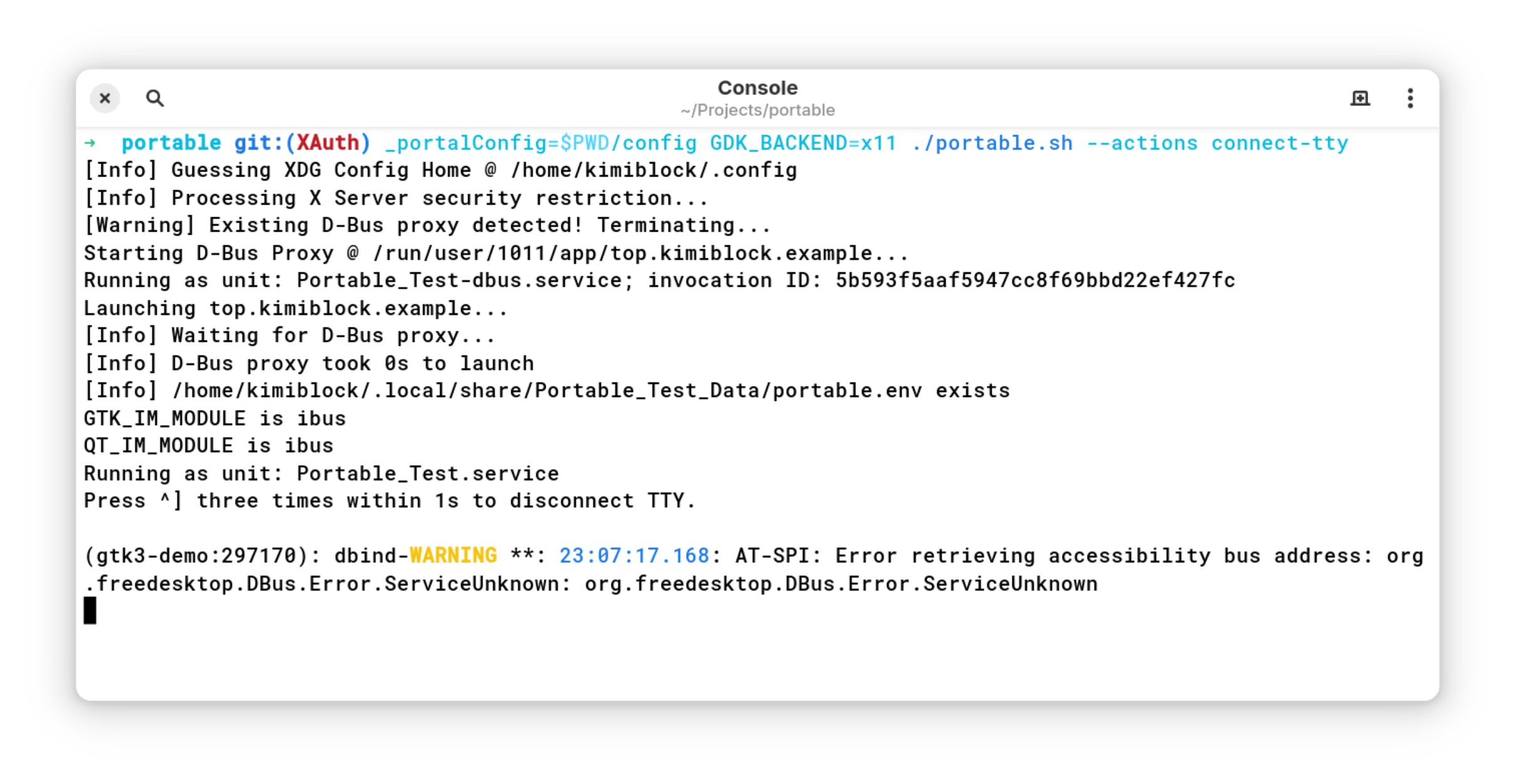Portable is a sandbox framework targeted for Desktop usage and offers ease of use for distro packagers. It offers many useful features for users and packagers:
- Background Portal support.
- Access Control: Limits what the application can see, write and modify. Sandboxed applications are self-contained.
- Sharing files with the application, even if it doesn't support portals. portable creates a directory within the sandbox home to contain shared files.
- D-Bus filtering & accessibility support: Cuts off unneeded D-Bus messages thus eliminates the possibility to locate, spawn a process outside of the sandbox, mess with the host system and other possible exploits.
- Process Management: Monitors running processes and quit them with one click.
- Packaging Friendly as portable only requires a config file to function.
- Storage efficient compared to Flatpak: Using host system as the "runtime".
- Hybrid GPU workarounds are automatically applied to prevent waking up discrete GPUs, often caused by Vulkan and Electron applications.
Portable itself is still in development and have already been applied to Minecraft, WeChat, Wemeet, Obsidian, QQ and Discord.
Running untrusted code is never safe, sandboxing does not change this.
Discuss Development at #portable-dev:matrix.org
Install aur/portable-git, aur/portable or install files directly
install -Dm755 portable.sh /usr/bin/portable
install -Dm755 open.sh /usr/lib/portable/open
install -Dm755 user-dirs.dirs /usr/lib/portable/user-dirs.dirs
install -Dm755 mimeapps.list /usr/lib/portable/mimeapps.list
install -Dm755 flatpak-info /usr/lib/portable/flatpak-info
install -Dm755 bwrapinfo.json /usr/lib/portable/bwrapinfo.json
Preferred location:
# Modify before installing
install -Dm755 config /usr/lib/portable/info/appID/config
Environment variables are read from XDG_DATA_HOME/stateDirectory/portable.env
Start portable with environment variable _portableConfig, which is pointed to the actual config. It searches absolute path (if exists), /usr/lib/portable/info/${_portableConfig}/config and $(pwd)/${_portableConfig} respectively. The legacy _portalConfig will work for future releases.
- Debugging output can be enabled using a environment variable
PORTABLE_LOGGING=debug
Portable itself allows multiple instances. It automatically creates an identical sandbox and launches the application. Application itself may or may not support waking up itself.
The name of your .desktop file should match the appID, like top.kimiblock.example.desktop
Your .desktop file should contain the following entries:
X-Flatpak-Tags=aTag;
X-Flatpak=appID;
X-Flatpak-RenamedFrom=previousName.desktop;
--actions f5aaebc6-0014-4d30-beba-72bce57e0650: Toggle Sandbox, requires user confirmation.
--actions opendir: Open the sandbox's home directory.
--actions share-files: Choose multiple files to share with the sandbox. The file will be temporarily stored in XDG_DATA_HOME/stateDirectory/Shared, which is purged each launch.
--actions quit: Stop sandbox and D-Bus proxy. If the app fails to stop after 20s, it'll be killed.
--actions inspect: Enters the sandbox.
--actions debug-shell: Start bash in the sandbox instead of the application itself.
To manually execute programs instead of following the launchTarget config, start portable with argument --actions debug-shell. This will open a bash prompt and gives you full control of the sandbox environment.
If the sandbox is already running, then debug-shell is not usable. Instead you may want to use --actions inspect. This utilizes nsenter to enter the sandbox's user, mount and other namespaces respectively. This does now exactly mimic a portable sandbox environment, but useful if you want to poke around while the app is running.
This repository is available @ Codeberg due to AUR packaging for Chinese users.
